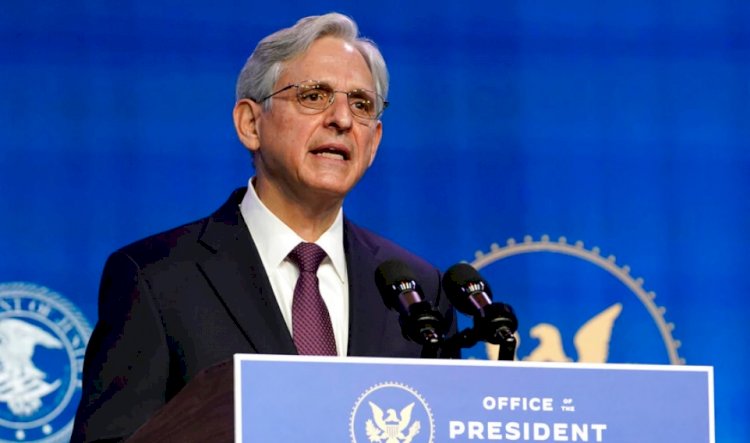Next Attorney General Faces Extra Challenges After Capitol Riot
Test of independence

Next Attorney General Faces Extra Challenges After Capitol Riot
With his selection of federal appellate judge Merrick Garland as his attorney general, President-elect Joe Biden is conveying a very different vision of the top U.S. law enforcement officer's role than the one pushed for years by President Donald Trump.
"Your loyalty is not to me," Biden said last Thursday, an apparent dig at Trump who famously demanded loyalty of subordinates and at recently departed Attorney General William Barr who was frequently assailed for serving as "Trump's personal lawyer."
"It's to the law, to the Constitution, to the people of this nation," Biden said.
Garland's nomination to the powerful post – essentially the nation's top law enforcement officer – came a day after a mob of angry Trump partisans stormed the U.S. Capitol in fury over Trump's baseless claims that he was cheated out of the November 3 presidential election.
The brazen raid, which left five people dead, including one U.S. Capitol policeman, has triggered a Democratic push to impeach Trump for the second time, this round for inciting violence by urging his supporters to "fight like hell" and march on the Capitol where lawmakers were meeting to certify Biden's election victory.
Denouncing the riot as "the culmination" of Trump's four-year, all-out assault on the rule of law and democratic institutions, Biden said restoring the Justice Department's independence and integrity is his top priority and that Garland would do that by serving not as his personal attorney "but as the peoples' lawyer."
Garland said that's how he wants it. He first came to national attention in 2016 when Republican Senate Majority Leader Mitch McConnell of Kentucky famously blocked his nomination by President Barack Obama to a seat on the Supreme Court.
Garland said he agreed to take the job of attorney general after being assured by both Biden and vice-president elect Kamala Harris that the department would retain its independence from political interference.
Even before the Capitol riots, Garland had his work cut out for him, facing consequential decisions over controversial Trump-era policies on immigration and civil rights and ensuring that a pair of ongoing investigations into the taxes of Biden's son, Hunter, and the origins of the federal probe into Russian interference in the 2016 election continue unimpeded.
Politically sensitive investigations plagued the tenures of both Barr and Trump's first attorney general, Jeff Sessions. Trump eventually forced both out when they failed to comply with his demands.
Test of independence
Garland is unlikely to meet their fate. But calls for an investigation into the Capitol Hill riots and their instigators – presumably Trump and his allies – create a whole new set of challenges for the incoming attorney general and present a test of his independence from the White House. The FBI and Department of Justice are aggressively hunting down and arresting the rioters as part of a nationwide investigation.
While Biden has previously made it clear that he does not want the Justice Department to investigate Trump after he leaves office, calls for accountability are likely to grow after Biden is sworn in.
"I think a lot of the game board has shifted in the last few days," said Kimberly Wehle, a professor of law at the University of Baltimore. "If you had asked me that a week ago, prosecuting a former president might not have been a priority for Joe Biden. But I'm not so sure (now)."
Wehle added: "I think [Garland] has a tremendous amount of work to do urgently to unpack what happened on January 6th, both in terms of the spectacular failure of law enforcement in response and the political figures' … contribution to what was an assault on the heart of American democracy itself."
A spokeswoman for Michael Horowitz, Justice Department inspector general, declined to say whether Horowitz was considering investigating the agency's response to the assault on the U.S. Capitol or whether he had received congressional requests for such an inquiry.
In making the case for impeaching and investigating Trump, Democrats are zeroing in on the speech the president delivered near the White House before sending a mob of his supporters to march on the Capitol. But some legal experts say there is no basis to investigate Trump for incitement or sedition.
"The President of the United States has the same free speech rights as others," said Jonathan Turley, a criminal defense attorney and law professor at the George Washington University who testified as a Republican-invited witness during Trump's first impeachment hearings in 2019. "I know of no federal case that would treat these speeches as a federal criminal act."
Turley nevertheless said Biden deserves credit for selecting someone with Garland's "integrity and intellect" as his attorney general.
"He has considerable experience on both the federal bench as well as the Justice Department," Turley said in an interview. "He is widely regarded for not just his intellect but his demeanor. He is someone who has always garnered support, even from those who disagree with aspects of his judicial philosophy."
Comparisons to past
Garland, 68, sits on the U.S. Court of Appeals for the D.C. Circuit, the second most powerful federal court in the country. Before he was appointed to the bench by former President Bill Clinton in 1997, Garland, a Harvard College and Harvard Law School graduate, shuttled between the private sector and the Justice Department where he served as a line prosecutor and senior official.
Before tapping Garland, Biden faced pressure from advocacy organizations to name a candidate with a civil rights track record, preferably an African American. One top contender for the job was Doug Jones, a longtime Biden friend and Democratic Senator from Alabama who lost his reelection bid in November. In the end, he settled on Garland, a white man, balancing the nomination with appointments of three women in senior positions – two of them prominent civil rights advocates who previously served in the Obama Justice Department.
"It certainly makes sense for the new president to pick someone not from the world of politics but very much from the world of law," said Susan Estrich, a former Harvard Law School classmate of Garland who is now a professor of law at the University of Southern California. "It just sends a different message."
Historically, many U.S. presidents have chosen close friends and allies to head the Justice Department; President John F. Kennedy picked his brother Bobby Kennedy for the job. Others, however, have turned to outsiders.
In the wake of the Watergate scandal, Republican President Gerald Ford tapped Edward Levi, a renowned president of the University of Chicago, to run the Justice Department. Along the way, Levi won accolades for restoring the department's independence and integrity.
In recent weeks, some legal scholars have compared the role Garland will likely play at the Justice Department to that played by Levi. In their remarks, both Harris and Garland invoked the late Levi's name. Garland noted that the norms created by Levi led to policies that ensured the department's adherence to the rule of law.
"If confirmed, my mission as attorney general will be to affirm those policies as the principles upon which the department operates," Garland said. "As Ed Levi said at his own swearing in, 'Nothing can more weaken the quality of life, or more imperil the realization of the goals we all hold dear, than our failure to make clear by words and deed that our law is not the instrument of partisan purpose.'"
VOA








































